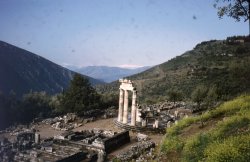Oracles in the ancient world
What is an oracle?
An oracle was a response given to individuals or representatives of a state who came to a special place (a fixed geographical location - they were not portable!) to ask a question of a god or hero (hero defined as former mortal promoted to divine status - such as Heracles). Usually the question had to be submitted by - and the answer interpreted by - a priest or priestess.
Where were they?
 You
can take a virual tour of some of these sites thanks to Metis. Click on
the "go there!" link. The most important in the Classical period
were:
You
can take a virual tour of some of these sites thanks to Metis. Click on
the "go there!" link. The most important in the Classical period
were:
Dodona:
Zeus' oracle was the oldest in Greece (and most consulted by private individuals with personal problems)[http://www.culture.gr/2/21/211/21112a/e211la01.html]. The god spoke either through the rustling of oak leaves in the extensive woods surrounding the site or through the doves that were common there. The client scratched his question on a lead tablet (many survive) and got a simple yes or no answer from the threepriestesses (who also called themselves "doves").
 Delphi:
Delphi:
The favourite for corporate consultation was Apollo's at Delphi. [http://en.wikipedia.org/wiki/Delphi] Ancient tales of the priestess being in some way intoxicated by vapour from the earth have gained some scientific backing recently.
Epidaurus:
Asclepius, son of Apollo, was most consulted on medical questions. Visitors here expected action, not just advice. The patients were required to sleep in a building near the temple, where they were visited by a dream and woke up cured. Inscriptions testify to the efficacy of this treatment, many sceptics having experienced cures.
Alcetas of Halieis: the blind man saw a dream. It seemed to him that the god came up to him and with his fingers opened his eyes and that he first saw the trees in the sanctuary. At daybreak he walked out sound. (Inscription #18)
As a result of the plague in the 430s the sanctuary found itself expanding rapidly - with a new temple and the famous theatre, and many other imposing buildings. Use the link for examples of cures and a full discussion.
Lebadeia:
Trophonius. A bizarre and intimidating ritual - involving spending a night in a narrow underground chamber - had a life-changing effect on visitors, according to Pausanias.
Oropus:
Amphiaraus. A myth similar to that of Trophonius: a fleeing hero is swallowed up by the ground. The spot becomes an oracular site. The Amphiaraion lies between Athens and Thebes - in a very beautiful small valley. It functioned very similarly to Asclepius' oracle at Epidaurus: patients seeking curea slept outside the temple on ram-skins. Amphiaraus visited them while they slept. When they awoke they were cured. (This process is called incubation) It was also consulted more formally in the manner of the Delphic oracle - it was one of the oracles visited by Croesus, when trying to find out if he should attack Persia. (Herodotus 1.46 etc) Go there! [http://www.helleniccomserve.com/amphiarion.html]
Bura :
Heracles. Bura was a town on the southern coast of the gulf of Corinth, now under the sea. Here divination was practised by the drawing or throwing of dice.
Ammon:
(in Libya) : Zeus - famously visited by Alexander the Great
.In later times these were joined by:
Didyma : Apollo in Asia Minor. Go there!
Apamea : Apollo in Syria
Cumae: Italy

